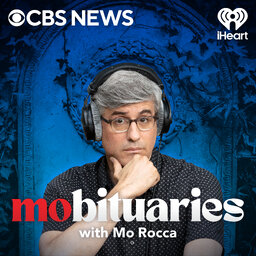Sammy Davis Jr.: Death of the Entertainer | Reviving a Mobit
This week, we’re celebrating the birthday of the legendary Sammy Davis Jr. by revisiting a special Mobit. From the age of three Sammy Davis, Jr. did it all better than anyone else - singing, dancing, acting, even gun spinning. Mo talks to friends and family about what drove him to keep performing, even after the car crash that nearly killed him. Featuring Carol Burnett, Chita Rivera, Kim Novak, Dionne Warwick and more.
In 1 playlist(s)
Mobituaries with Mo Rocca
“CBS News Sunday Morning” correspondent Mo Rocca has always loved obituaries. Each episode of Mobitu…Social links
Follow podcast
Recent clips

Death of a Name | Reviving a Mobit
42:04

Marlene Dietrich Goes To War | Reviving a Mobit
13:07

Wishbone: Death of a Working Dog | Reviving a Mobit
37:11
 Mobituaries with Mo Rocca
Mobituaries with Mo Rocca